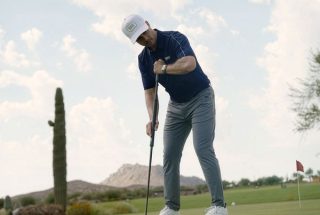THE 10-MINUTE INTERVIEW // Al Morris, President, Worldwide Golf
 |
Al Morris, president of privately held Worldwide Golf, conducts his business close to the vest. In December, though, the company purchased Edwin Watts Golf Shops, adding to a portfolio that includes Roger Dunn Golf Shops, Van’s Golf Shops, The Golf Mart and Golfers’ Warehouse. The purchase also merged two of the largest golf specialty retailers and made Worldwide Golf a larger player at the national retail level.
Morris recently spent 10 minutes speaking with The Golf Wire’s Stuart Hall about the Edwin Watts purchase, Worldwide Golf’s origins and the iconic names in golf retail history.
Q.: What made the purchase of the Edwin Watts Golf Shops so appealing?
MORRIS: We had more competition moving into our markets and we needed to grow. We have always been opportunistic buyers and felt that this gave us an opportunity to grow and capitalize on the similarities between our two companies. Our cultures are very similar and the strength of their stores and employees made this an attractive purchase.
We had never looked at Edwin Watts before. I know they had been sold to some private equity firms and, like I said, we’re pretty opportunistic buyers. We were never involved in those pre-bankruptcy discussions in purchasing Edwin Watts.
Sun Capital Partners [which previously owned Edwin Watts before filing for Chapter 11 bankruptcy protection on Nov. 4] actually approached us back in 2012 and wanted to buy us, but we weren’t for sale. And here they are 18 months later, bankrupt and we’re buying them.
Q.: You acquired 45 stores in 13 states, what is the status of those. You recently reopened the store in Lexington, Kentucky, so are you doing with the stores?
MORRIS: We actually purchased 48 stores at the auction and bought back one additional store the following week. We’ve since reopened the Lexington, Kentucky, store and now have plans to open four more.
By early May we should have 49 Edwin Watts stores operating and 5 Uinta stores. Edwin Watts had purchased the Uinta business in mid-2012 and had changed the name to Edwin Watts. We are re-branding the stores back to Uinta Golf as we feel the history and heritage dating back to 1971 is something we don’t want to waste.
Q.: One of the first things you did was implement Worldwide Golf’s 90-day satisfaction guarantee policy. What other changes are we likely to see?
MORRIS: Yes, we did institute our 90-day satisfaction guarantee immediately. While this is one of our strongest policies it only works when combined with the long term and knowledgeable employees who are already in place to allow our customers to buy with confidence.
In addition, we have already bumped up the inventory levels back to where we feel they should be and have returned to advertising aggressively in all markets.
Q.: Talk about the origins of the 90-day satisfaction guarantee, its origins.
MORRIS: It actually started with Nordstrom. My CEO, Craig McCallister, went into Nordstrom with his wife and saw how great this return policy was and we tried it back in 1984 or ’85 and it’s been with us ever since.
It’s a way to give our customers the confidence to shop and if something isn’t right, then we will take care of it.
Q.: Briefly, how did you come to form Worldwide Golf?
MORRIS: Worldwide Golf is actually just the name of a corporation that owns our Roger Dunn chain. We are very confusing from an accounting standpoint as we have around five or six different corporations. The vendors had started to refer to us as Worldwide Golf and we’ve never corrected them.
Our original company is The Golf Mart, which started in 1980 as a franchise of Roger Dunn by our owner, Craig McCallister. We then opened Golf Mart stores in San Diego and San Francisco until buying the Roger Dunn chain in 1993. Our next major purchases were Vans Golf in 1997, Nevada Bob’s Hawaii in 2006 and the Golfers Warehouse chain in 2009. We had also brought numerous small chains or individual stores along the way as well. Now with the Edwin Watts/Uinta purchase we shall have 88 stores across the country.
Q.: Why do you keep all of these regional store names, why not incorporate them under one Worldwide Golf name?
MORRIS: The equity they have built up in their markets. If you go to south Florida and ask who Roger Dunn is, they have no idea. Edwin Watts probably has the strongest national presence because they have been No. 1 in the catalog category and in the back of Golf Digest since I was a kid.
I don’t know if the brand equity that we have built up with our own existing brands is worth throwing away and changing to Edwin Watts at this point. Especially on the heels of [Edwin Watts] going through bankruptcy and poor inventories and the lack of advertising it had in all of 2013.
Q.: You bought the Roger Dunn Golf Shops chain in 1993, and once said “Roger had the foresight to find a way around the suggested retail price.” What did you mean by that?
MORRIS: What I said in 1993 really applied to all of the iconic founders of the brands we own today. Be it Roger Dunn, Frank Bocchini, Gordie O’Neal or Edwin Watts, all of these gentlemen found a way to offer lower prices to the consumer than that at the local golf club. Whether it is an older model or simply taking a smaller margin, these men started the off-course discount world that we still live in today.
Q.: How have you seen the retail market change over the years? How much has apparel come into play, for example?
MORRIS: When I first started in retail we would buy Hagar slacks or Sansabelt slacks and you really had almost golf only apparel. Now you can by golf apparel anywhere. That being said, it’s become a big part of our business because the price points are higher and the brands are becoming more dominant.
Q.: How has the retail buying experience changed throughout the years?
MORRIS: I think it has been an evolution. It used to be strictly price and then it became price and selection, and then it got to the point you could get a club fitting, you could get lessons. It’s just been a consistent evolution into a complete golf experience.
It has also lowered the cost of entry. It’s making [the game] accessible to more people. Otherwise people couldn’t get into private clubs to buy product or they would go into pro shops at public golf courses that don’t carry the wide selection and their prices are higher. So it has to help participation because it has lowered the barrier of entry.
Q.: There is a premium being placed – or should be placed – on customer service today. Is there more that can be done for the consumer?
MORRIS: If there is more to be done, then I would like to know what it is. You can preach it, but practicing it is a whole different ballgame. Not only is the 90-day guarantee key to our customer service, but it’s how you execute it as well.
Contact:



